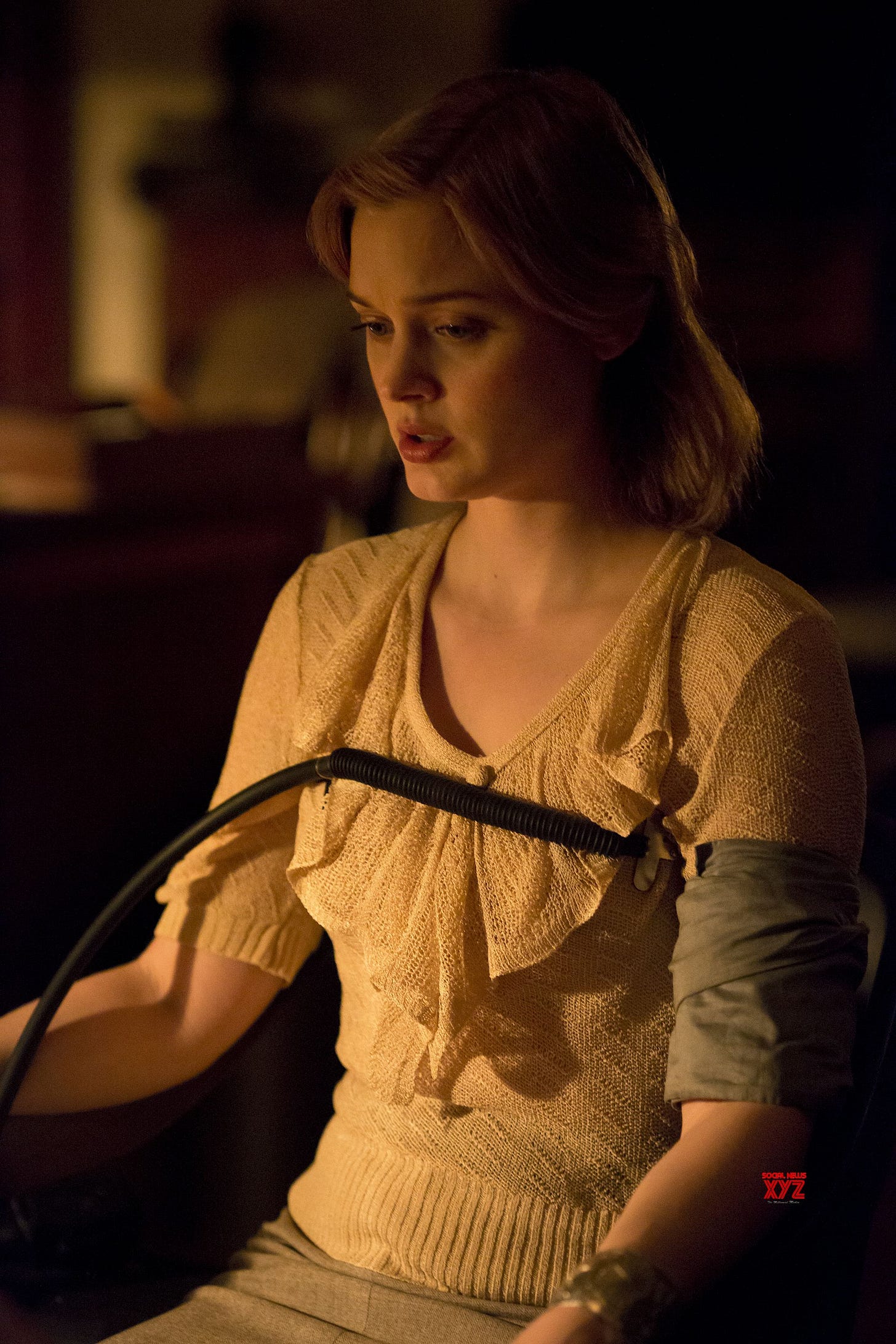In prison, I read Jill Lepore’s “The Secret History Of Wonder Woman”, a pretty eye-opening account of the life of your latest Most Interesting Man. Professor William Moulton Marston, who passed away in 1947, started out as a college professor, became a guy who liked to be tied up during sexual foreplay, then somehow used that as the basis for the invention of the lie detector, then used that idea combined with his kinks to create Wonder Woman. Not to take anything away from Lepore’s literary talents, but that’s a lot of story, just enough to fit a satisfyingly large book.
In this movie (which is not an official adaptation but might as well be), director Angela Robinson tactfully pulls away the veil of Marston’s private life, revealing a man with a powerfully subservient relationship with wife Elizabeth. As played by Luke Evans and Rebecca Hall, they are college professors who nonetheless compliment each other well. While William theorizes and pontificates, it is Elizabeth who is the forceful, decisive presence in the household. Which is why it is a surprise when William invites young, attractive student Olive (Bella Heathcote) into his office, into their home, and into their bed.
Somehow, this is one of the very few respectful Hollywood glimpses of a throuple. Elizabeth bristles at the arrival of a younger woman (and no one bristles quite like Rebecca Hall). She naturally feels there is competition, that the order of behavior between her and William has been interrupted. Soon, she realizes that William, an uber-feminist if there was one, sees power in the idea of surrendering to both women. This is bondage in the intellectual sense – William sees within such a narrative men clamped down and rendered powerless, and women breaking said bonds that limit their societal advancement. And, shucks, it kind of arouses William.
This is the thirties, so naturally, this doesn’t play well among the faculty. Rumors abound, and they’re not far from the truth. It’s hard to be too kink positive when you’re guilty of literally sleeping with a student. So the public scrutiny forces a job change, which leads to Elizabeth’s realizations about William being tied up. Soon, William patents the lie detector. Which, to him, is just a fun toy, a flirty game for couples. And, as the movie shows, a beta version of Wonder Woman’s Lasso Of Truth.
Robinson’s storytelling is a bit too dry and straightforward, so the movie can’t help but feel that it’s touching on one bit followed by another bit followed by another. So we move right into the creation of Wonder Woman, though it dovetails with previous storylines in spotlighting Marston’s struggles with censors moreso than any creative moments. Specifically, they are unhappy with the amount of bondage, which is just wild. Can you imagine that today? The idea that editors would constantly complain about bondage, but otherwise just cope with it in mainstream kids’ entertainment? When Disney showed “Lightyear” in Oklaholma a couple years back, a theater put up a sign saying they would try to “fast-forward” a barely-noticeable gay kiss. We have not come very far at all.
With the storytelling being so stilted and ineffectual (it often feels like an upscale History Channel special), you’d hope the performances could keep up. The best reason to recommend this is for Rebecca Hall’s thoughtful, elastic turn as a woman questioning her previously-rigid sexuality. Her hierarchy is threatened with Olive’s arrival, but Marston’s initially-surprising stance is to remain submissive, allowing her to claim a new dynamic within relations with Olive. This emotional terrain is skillfully navigated by Hall and an increasingly-awakened Heathcote. It’s unfortunate that Evans, a fairly lightweight dramatic actor, cannot keep up, cannot present a complex inner life for his Marston.
If you read Lepore’s book (or maybe see this movie, but to a lesser extent), you’ll begin to question exactly why people still put so much faith in a polygraph test. In fact, results of one are typically inadmissible in court. Expects will cite scientific unreliability. But maybe it’s because it was never meant to detect lies at all, merely the perception of lies, and the raised blood pressure of bondage. Hard to believe the device constantly used to supposedly wring the truth out of others was conceived by its creator as a lovers’ aid.
Indeed, polygraphs are not used in trial. But they are used, and trusted, in post-incarceration life. Many federal inmates on supervised release have to deal with parole officers, and conditions of their supervised release often involve actual polygraph results. The law is not a strict fixture in our lives, but a force constantly searching for ways to jeopardize the freedom of those that have already served. Are polygraphs all that unreliable? Do you want to be in a position to find out?








I really liked this movie and had a chance to talk to Angela Robinson about it (who at the time was developing a Strangers in Paradise movie that still hasn't seen the light of day). Great review!
Just saw this headline:
F.B.I. has been using polygraphs to test the loyalty of senior employees
After I finished laughing, all I could think of was this post.
I wonder if Marston knew J. Edgar Hoover ;)